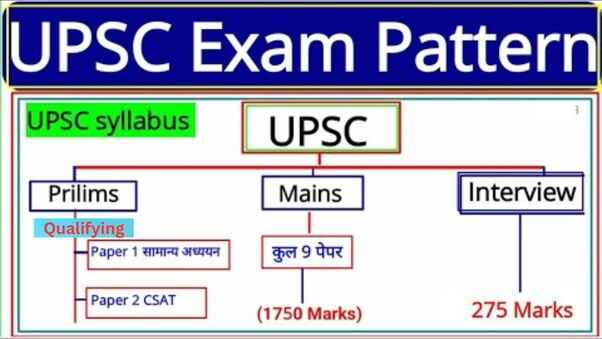upsc exam pattern: For the purpose of hiring individuals for a variety of services and positions within the government, the UPSC (Union Public Service Commission) administers a number of competitive examinations. Depending on the particular test being taken, the exam patterns can differ greatly. One of the most well-known and sought-after UPSC tests, the UPSC Civil Services Examination (CSE), will be thoroughly explained in this thorough explanation.
Table of content

UPSC Civil Services Examination (CSE) Pattern:
The UPSC CSE is regarded as one of India’s most prestigious and difficult exams. The Preliminary Examination (Prelims), the Main Examination (Mains), and the Personality Test (Interview) are the three steps of the testing process. Different facets of a candidate’s knowledge, skills, and personality qualities are evaluated at each level. Let’s examine each stage in more depth:
Preliminary Examination (Prelims)
The Preliminary Examination, commonly referred to as “Prelims,” is the first stage of the UPSC CSE. It consists of two papers: General Studies Paper I and General Studies Paper II (Civil Services Aptitude Test or CSAT). Here’s an overview of this stage:
General Studies Paper I
- Objective type questions (Multiple Choice Questions – MCQs)
- Covers a wide range of subjects, including current events, history, geography, polity, economy, science, and technology,environment, and more
- Total marks: 200
- Negative marking for incorrect answers
- Considered for both qualifying to the Mains and determining the cut-off for Prelims
General Studies Paper II (CSAT)
- Also objective type questions (MCQs)
- Assesses aptitude, logical reasoning, analytical ability, comprehension, and decision- making skills
- Total marks: 200
- Negative marking for incorrect answers
- Qualifying paper (you need to score 33% to pass, but the marks are not counted for the final rank)
The Prelims aim to filter out candidates for the Mains and are designed to test a candidate’s awareness, analytical abilities, and decision-making skills.
Main Examination (Mains)
The candidates who clear the Prelims move on to the Main Examination, which is the second stage of the UPSC CSE. The Main Examination is a written examination and consists of nine papers, which are further divided into seven papers that are counted for ranking and two qualifying language papers. Here’s an overview of this stage:
Qualifying Language Papers
- These papers are meant to ensure a candidate’s basic language skills.
- Papers include Indian languages and English.
- Candidates need to score a minimum of 25% in each qualifying paper.
Main Examination Papers
Essay Paper:
- Candidates are required to write two essays, each with a word limit.
- Tests a candidate’s expression, clarity of thought, and coherence.
General Studies Papers (I, II, III, and IV)
These papers cover a wide range of subjects, including history, geography, polity, economy, ethics, science and technology, and more.
Each paper assesses different aspects of a candidate’s understanding, analytical abilities, and problem-solving skills.
Optional Papers (Optional Paper I and Optional Paper II)
Candidates choose one optional subject from a list of subjects.
Each optional paper consists of two papers.
These papers allow candidates to showcase their expertise in a specific subject area.
Personality Test (Interview)
The UPSC CSE’s personality test, sometimes known as the “interview,” is the last phase. Candidates are only selected for this step if they pass the main examination. An outline of the personality test is given below:
conducted by a group of knowledgeable and impartial observers.
Examine the applicant’s general demeanor, fitness for public service, breadth of knowledge, and coping skills under challenging circumstances.
Along with academic subjects, current affairs, general knowledge, and topics of shared interest are also covered in the questions.
The purpose of the interview is to assess a candidate’s attitude, communication abilities, leadership potential, and quick thinking.
UPSC Exam Pattern For IAS Preliminary Examination
| Stage | IAS Preliminary Examination |
|---|---|
| Number of Papers | 2 Papers |
| Paper I | General Studies Paper I |
| Exam Duration | 2 hours |
| Total Marks | 200 marks |
| Type of Questions | Objective-type questions (MCQs) |
| Subjects Covered | Current events, history, geography, polity, economy, science, technology, environment, culture, and more |
| Purpose of Paper I | Tests awareness, analytical abilities, and decision-making skills |
| Negative Marking | One-third (0.33) of the marks assigned to the question |
| Paper II | General Studies Paper II (CSAT) |
| Exam Duration | 2 hours |
| Total Marks | 200 marks |
| Type of Questions | Objective-type questions (MCQs) |
| Subjects Covered | Assesses aptitude, logical reasoning, analytical ability, comprehension, and decision-making skills |
| Purpose of Paper II | Qualifying paper (33% passing score, marks not counted for final ranking) |
| Negative Marking | Same as Paper I |
| Medium of Examination | Question papers available in Hindi and English, candidates can choose preferred medium |
| Number of Attempts | Maximum of 6 attempts for General Category candidates, with relaxations for reserved categories |
| Cutoff for Qualifying | Minimum qualifying marks in Paper I |
| Selection for Mains | Around 12 to 13 times the total vacancies |
| Normalization | Used to adjust variations in difficulty levels across different sessions |
FAQs
The Union Public Service Commission (UPSC) is a constitutional body responsible for conducting various civil services examinations in India to recruit candidates for different government positions.
Some of the major exams conducted by UPSC include the Civil Services Examination (IAS, IPS, IFS, etc.), Combined Defense Services Examination (CDS), National Defense Academy Examination (NDA), and Central Armed Police Forces Examination (CAPF).
The UPSC CSE consists of three stages: Preliminary Examination (Prelims), Main Examination (Mains), and Personality Test (Interview)
The syllabus includes topics like current events, history, geography, polity, economy, science, technology, environment, and more for GS Paper I. CSAT assesses aptitude, logical reasoning, analytical ability, comprehension, and decision-making skills.
Effective preparation includes thorough understanding of the syllabus, extensive reading, note-making, practicing mock tests, previous year’s papers, and staying updated with current affairs.



















